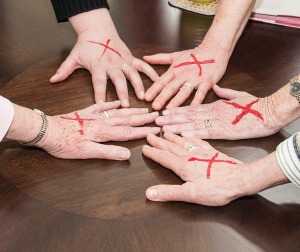Periodically on Fridays I will share some words of wisdom from the founder of the Sisters of St. Joseph of Peace. Known in religion as Mother Francis Clare, Margaret Anna Cusack was a prolific writer and advocate for women and children. She was very attuned to the social realities and situation of oppressed people in her day.
Her contemporary experience was the Irish famine. The common folks were starving, and the young and able bodied (men and women) were being forced to emigrate to make money to keep their family alive back home. Margaret Anna, then Sister Francis Clare Cusack of the Poor Clare Convent in Kenmare, County Kerry, experienced this first hand. Her Sisters fed the poor in the area district, and she funded a famine relief fund for the people of Ireland through the sale of her books. As an example of her impact, here’s a tidbit from a letter to the editor of the Dublin Free Press by a Mr. J. Sullivan:
The poor, starving people have to depend almost entirely on the funds obtained by that lady for relief. She has disbursed within a very short period, very little short of $10,000, to the poor of that district …
 Serving the poor in need was not enough for her. She asked questions as to why they were poor, and looked at the social structures that perpetuated (and created) the problem. In terms of trafficking, she also looked at the situation where young women especially were made vulnerable to victimization. She saw that they were being forced to emigrate to seek work, in factories or most often as domestic servants, and she was worried for their safety–spiritually as well as physically.
Serving the poor in need was not enough for her. She asked questions as to why they were poor, and looked at the social structures that perpetuated (and created) the problem. In terms of trafficking, she also looked at the situation where young women especially were made vulnerable to victimization. She saw that they were being forced to emigrate to seek work, in factories or most often as domestic servants, and she was worried for their safety–spiritually as well as physically.
“How many girls are driven to a life which they abhor simply to get bread, the bread which is denied to them by those who squander on folly what is due to justice!”
“I knew that the only way out of their victimization was to help them become economically and intellectually independent.”
She reflected on what her faith taught her, and was motivated to do as much as she could for those who Jesus had loved so well … poor and starving people.
And she acted.
I wish with all my heart that our girls were not obliged to leave their own country; but since they will do so, it is a most urgent duty of charity, and it would undoubtedly be a public benefit both to America and Ireland, to help them prepare for their future lives.
She founded St Joseph’s Sisters of Peace in 1884. Her aim was to prepare young Irish women before they emigrated, giving them skills that would help them both to survive and support their families. She also opened homes for “working girls”– meaning simply girls that worked. These homes were places of safety, rest, and renewal. Really, if you look at it through the lens of what we know today about human trafficking, she was seeking to support vulnerable women and prevent them from being trafficked.
So, what does she have to say to us today about human trafficking? Based on her own response in her day, I think she would encourage us today :
- Meet the needs of vulnerable people (Charity)
- Examine Root Causes (Social Analysis)
- Make connections (Theological Reflection)
- Act to change the systems where injustice thrives (Systemic Justice)
In light of all this, I am very proud of something our CSJP Leadership Team did yesterday – we approved a statement in support of the End Modern Slavery Initiative Act of 2015, an important piece of bipartisan legislation recently introduced in Congress. We also joined in Shine a Light on Slavery Day, which is today, by taking a picture of our hands with red x’s marked on them to show our commitment to end slavery.
There is a social media campaign today as part of Shine a Light on Slavery Today. If you blog, tweet, or use Facebook, consider writing on the issue of modern slavery/human trafficking and add the hashtags #EndItMovement and #EndSlaveryAct.




